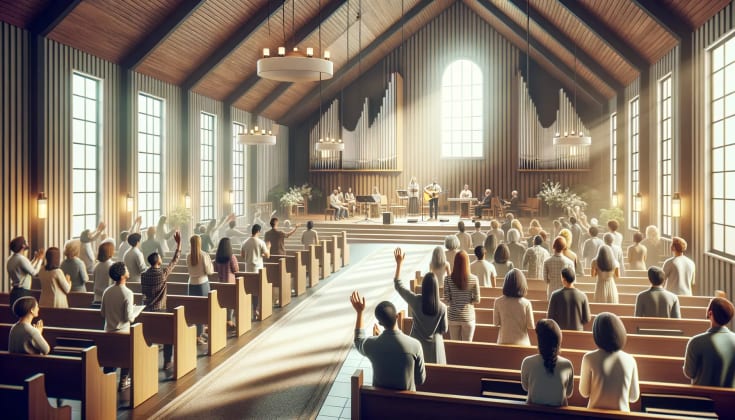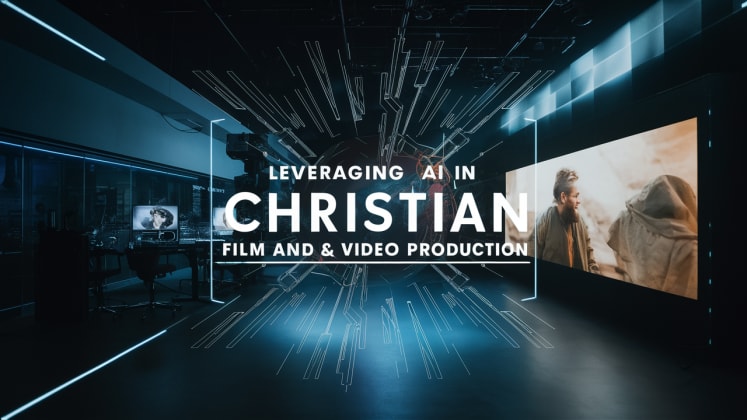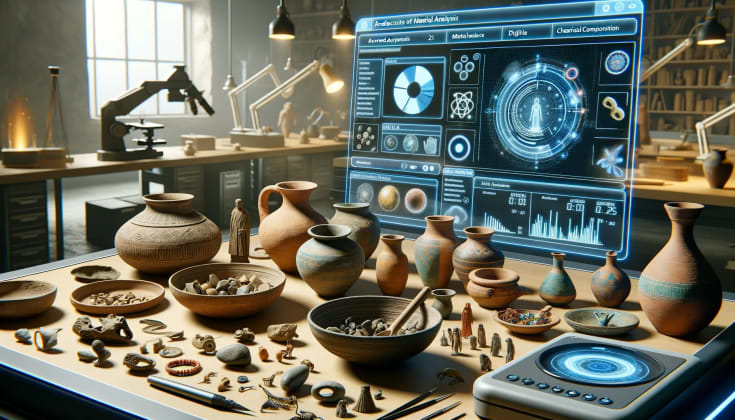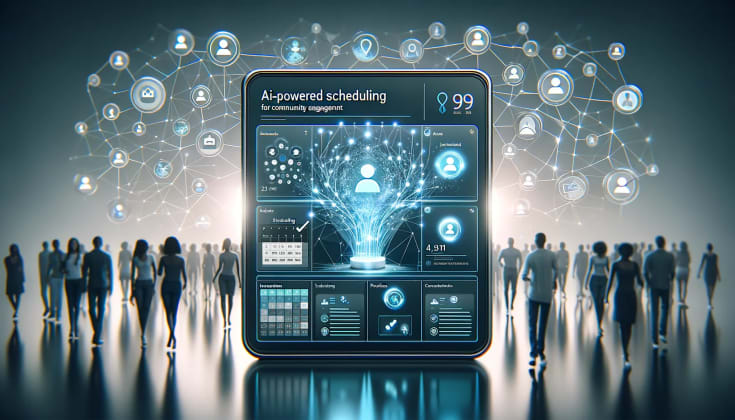Using AI as a Tool for Christian Art and Music Creation
God never intended for technology to take the place of the human heart in worship. Yet, the capabilities of AI are nothing short of astounding. It can analyze, create, and innovate in ways that we could have hardly imagined merely a decade ago. For instance, a recent study indicated that AI-driven applications like DALL-E and OpenAI's music generation algorithms are pushing boundaries in creative arts, generating outputs that can sometimes be mistaken for human-made art and melodies. As we rifle this exploration, we'll discuss:
- Is an AI-created hymn genuinely worshipful?
- Dependence on AI: Over-reliance on AI tools might lead us away from the spiritual act of creating.
- Moral Implications: Algorithms inherently contain biases, which may impact the biblical accuracy and theological integrity of AI-generated art.

"But test everything; hold fast what is good." 1 Thessalonians 5:21
Practical Applications in Music Ministry
AI's role in music ministry can be both transformative and complementary. Imagine a digital assistant that can help church bands compose music tailored to sermon themes or seasonal events. Tools like Amper Music or Jukedeck are already making waves in the industry, allowing artists to generate music tracks with ease.
AI in Hymn Composition
- Speed and Efficiency: AI can quickly compose hymns that align with specific sermon topics or messages.
- Customization: Custom music can be tailored to fit various congregational needs, from worship sessions to special events.
- Simplicity in Use: Even those with minimal musical expertise can create impactful music.
Take FaithGPT’s own AI hymn composer as an example. Our tool can generate biblically-centered music, allowing worship leaders to create new worship songs inspired by Scripture.
"Sing to the Lord a new song; sing to the Lord, all the earth." - Psalm 96:1
Real-World Examples and Success Stories
There's a growing list of churches and Christian creatives using AI to enhance their ministries. One inspiring example is Hillsong Church, which has experimented with AI-driven stage designs and music tracks. Similarly, Life.Church, known for its digital-first approach, uses AI to analyze worship trends and create more engaging worship experiences.
Case Study: Overcoming Creative Blocks
A small church in Ohio struggled with composing new music for their youth group. They turned to AI for assistance, using tools like Magenta to create fresh, vibrant melodies. The result? More engaged youth and a rejuvenated music ministry.
Addressing the Fear of AI Replacing Human Creativity
A common concern is that AI might replace human creativity. But I believe that AI should be seen as an extension of our God-given talents, not a replacement. AI can do the repetitive, tedious tasks, so we can focus on the more profound, creative endeavors that truly require human touch and spiritual discernment.
"The plans of the diligent lead surely to abundance, but everyone who is hasty comes only to poverty." - Proverbs 21:5
Biblical Integration and AI
Constantly integrating biblical truths and consulting Scripture can help. This can involve:
- Scriptural Cross-Referencing: Ensure every created work aligns with biblical teachings.
- Community Review: Engage other believers to give feedback on the integrity of the AI-generated content.
- Regular Audits: Periodically review the content to ensure it remains spiritually sound.
Incorporating Scriptural Themes
By embedding scripture into AI models, we can create context-aware tools that respect and reflect Christian values. For example, consider an AI algorithm trained on biblical texts to formulate prayers or liturgical scripts that are theologically sound.

Advantages of AI in Artistic Development
- Accessibility: AI tools make creative resources accessible to churches with limited budgets.
- Innovation: New forms of artistic expressions can emerge, enriching church activities.
- Collaboration: AI can serve as a bridge, facilitating more collaborative creative works.
Collaborative Platforms
Platforms like FaithGPT.io harness AI to offer Bible study tools that aid in both the understanding and creative exploration of the Scriptures. By fostering a spirit of collaboration rather than competition, we can encourage a more universal and empowering artistic environment.
Expanding the Use of AI in Worship Services
Incorporating AI into worship services isn't merely a trend andit's an opportunity to expand the ways we can glorify God. Here are several ways to incorporate AI effectively:
- Service Planning: AI can help in planning worship services by analyzing past service data to suggest song choices, sermon topics, and liturgical elements that resonate most with your congregation.
- Visual Arts: AI-generated visuals can enhance sermon presentations, making biblical stories and messages more engaging and accessible.
- Interactive Elements: Use AI to create interactive worship experiences, such as personalized prayer suggestions or AI-driven Bible quizzes that engage the congregation during service.
Example: Creating Engaging Sermon Visuals
Imagine using AI tools like MidJourney to design stunning, contextually accurate visuals for your sermon on The Prodigal Son. These visuals could help illustrate the story in a way that connects emotionally with your congregation, enhancing their understanding and engagement.
AI and Art Therapy in Christian Counseling
Another remarkable application of AI in the Christian space is in art therapy, mainly in counseling settings. Many Christian counselors are finding AI-powered tools like Artbreeder to be invaluable in helping clients express their emotions through art.
How AI Assists in Art Therapy
- Emotional Expression: AI can generate art based on an individual's emotional inputs, helping them visualize and process their feelings.
- Therapeutic Customization: AI can customize therapy sessions based on the unique needs of each client, providing more targeted and effective treatments.
- Biblical Integration: Counselors can use AI to integrate biblical themes into the therapy process, helping clients find spiritual and emotional healing.

"He heals the brokenhearted and binds up their wounds." - Psalm 147:3
Ethical Concerns of AI in Christian Art and Music
The integration of AI into Christian art and music isn't without ethical concerns. Here are some key points to consider:
- Data Privacy: Ensure that any data used by AI systems respects privacy and confidentiality, peculiarly in counseling settings.
- Algorithmic Bias: Be aware of potential biases in AI algorithms that could affect the theological accuracy or inclusiveness of AI-generated content.
- Transparency: Make it clear to your congregation that AI is being used, and provide transparency about how it aids in the ministry.
Addressing Ethical Concerns
Ensure ethical use by:
- Regular audits and reviews of AI-generated content.
- Incorporating feedback from diverse voices within the congregation.
- Maintaining a strong focus on scriptural integrity and theological soundness.
The Future of AI in Christian Creativity
Looking ahead, the potential applications of AI in Christian creativity are vast. From virtual reality worship experiences to AI-driven community outreach programs, the future is brimming with possibilities. it's crucial to navigate this future with discernment, ensuring that our creative expressions continue to glorify God and build up the body of Christ.
Future Trends to Watch
- Virtual Reality Worship: AI-powered VR can create immersive worship experiences, allowing congregants to participate in biblical storytelling in a new, engaging way.
- AI-Enhanced Community Outreach: Using AI to identify and meet community needs more effectively, whether through charity programs or spiritual counseling.
- Personalized Faith Experiences: AI-driven apps that offer personalized Bible studies, prayer routines, and worship suggestions based on individual spiritual journeys.

"And let us consider how we may spur one another on toward love and good deeds." - Hebrews 10:24
Conclusion: Embracing AI with Discernment
In sum, AI is a powerful tool that can enhance our art and music creation, provided we wield it with discernment and faithfulness to biblical principles. By integrating AI responsibly, we can enjoy both efficiency and creativity, creating beautiful works that glorify God.
Let us remember, as stated in Colossians 3:17, "And whatever you do, in word or deed, do everything in the name of the Lord Jesus, giving thanks to God the Father through him."
I encourage you to probe, create, and innovate, but always with an eye on God's Word and a heart dedicated to His glory.
"For from him and through him and to him are all things. To him be glory forever. Amen." - Romans 11:36
FAQs
1. Is using AI in worship services unbiblical?
Using AI as a tool is not unbiblical as long as it aligns with Scriptural teachings and aids in glorifying God rather than replacing the human heart in worship.
2. How can AI-generated music be integrated into our church services?
AI-generated music can serve as a supplementary resource, providing theme-based compositions that can be adjusted and personalized by your music ministry team.
3. Are there any ethical concerns with AI systems learning from biblical texts?
Yes, it is essential to ensure that AI models respect the theological context and don't distort the message of the Scriptures.
4. Can AI replace human artists in the church?
AI should serve as an additional tool that assists in overcoming creative limitations and expanding artistic possibilities for worship.
For more insights on AI-assisted writing for Christian authors and bloggers, click here.
Related Articles:






